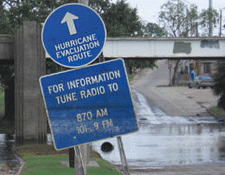September is Preparedness Month
Each September, National Preparedness Month encourages and reminds Americans to be prepared for disasters or emergencies in their homes, businesses, and communities.
Homeowners, families, communities, and businesses can use this opportunity to find ways or help others understand more about preparing for disasters and reducing risks to health and the environment. There are many ways to reduce risks from contamination, leaks, spills, hazardous materials, and other dangers.
- General information about any emergency
- How to report emergencies
- Individuals and homeowners
- Communities
- Schools, businesses, or other facilities
- Share information
September is also the peak of hurricane activity. Learn more about:
How to report emergencies
- Call 911 if you are in immediate danger, or if someone is injured, has trouble breathing, or is unconscious.
- To report oil, chemical, or hazardous substance releases or spills, call the National Response Center 800-424-8802.
- For pesticide poisoning, call Poison Control at 1-800-222-1222.
- If you use a mobile device, follow us at
- http://twitter.com/epa for updates and information.
- http://www.facebook.com/epa for information or directions where to get information.
Individuals and homeowners
Know ahead of time where you would run a generator. Generator exhaust is toxic and can sicken or kill you. Always put generators outside well away from doors, windows, and vents. Never use a generator inside a home, basement, garage, crawlspace, tent, shed, or any other indoor or enclosed area. Carbon monoxide (CO) is deadly, can build up quickly, and linger for hours.
- More information on emergencies and indoor air quality
- More about generator safety from the Consumer Products Safety Commission
If your drinking water is from a private well, know your state or local contacts for inspecting the safety your drinking water after a flood. Keep at least a 3-day drinking water supply per person -and don't forget pets. More about protecting your household drinking water well.
If your home is on a septic system, know whom to call to have it inspected after a flood, before you use it. Read more on septic systems and what to do after the flood.
Contractors need to use lead-safe work practices on emergency renovations on homes or buildings built before 1978. Activities such as sanding, cutting, and demolition can create lead-based paint hazards. Lead-contaminated dust is harmful to adults, particularly pregnant women, and children. About post-disaster renovations and lead-based paint.
Communities
Communities should plan ahead to handle exceptionally large amounts of disaster debris from damaged or destroyed buildings, supplies, trees or other green waste, carcasses, or other materials. Disposal problems can result from large amounts of debris but also from hazardous or toxic substances in the debris that can contaminate air, water, land, and food if not handled properly. Burning large amounts of debris to reduce volume may not be an option. More information on disaster debris.
EPA offers communities and facilities tools to help plan for for disaster or security threats to water systems. More about community water-based resiliency tools.
Schools, businesses, or other facilities
Suggested activities to help facilities prepare for severe weather conditions such as hurricanes.
Mold cleanup in schools and commercial buildings. Information for building managers, custodians, and others who are responsible for commercial building and school maintenance.
Industries and businesses that encounter spills or discharges in the aftermath should contact the National Response Center immediately. You or your organization may have legal requirements for reporting or for taking other actions, depending on the spill.
Contractors need to use lead-safe work practices on emergency renovations on homes or buildings built before 1978. Activities such as sanding, cutting, and demolition can create lead-based paint hazards. Lead-contaminated dust is harmful to adults, particularly pregnant women, and children. Important information about post-disaster renovations and lead-based paint.
Share information
Listen to or re-broadcast these Public Service Announcements.
Use or adapt pre-written messages to send to your Facebook friends or X followers.

from Ready.gov
- National Preparedness Month (September)
- Make a Plan!
